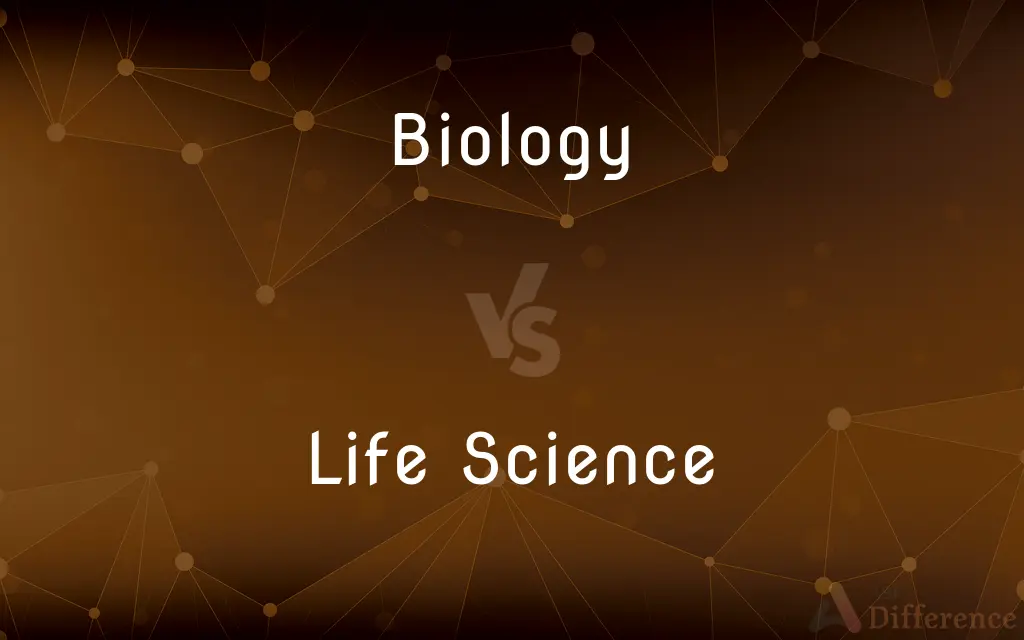Biology vs. Life Science — What's the Difference?
By Tayyaba Rehman — Published on January 4, 2024
Biology is a natural science concerned with the study of life and living organisms, while Life Science is a broader term encompassing all sciences that study living organisms, including biology.

Difference Between Biology and Life Science
Table of Contents
ADVERTISEMENT
Key Differences
Biology: Specifically focuses on the study of life, living organisms, their structure, function, growth, origin, evolution, and distribution. Life Science: Encompasses a broader range of disciplines related to living organisms, including biology, botany, zoology, microbiology, and more.
Biology: A single, specific discipline within the life sciences. Life Science: Includes various fields and specializations beyond biology, such as environmental science, biomedical science, and genetics.
Biology: Concentrates on understanding specific biological processes, organisms, and ecosystems. Life Science: Encompasses both the study of basic biological principles and applied sciences like biotechnology and medicine.
Biology: Typically a distinct academic department or course of study within the life sciences. Life Science: May be used as an umbrella term in educational contexts to include various biological and related scientific fields.
Biology: Focuses on research and knowledge in fields like ecology, marine biology, and evolutionary biology. Life Science: Encompasses industry-relevant fields like pharmaceuticals, healthcare, environmental management, and agricultural sciences.
ADVERTISEMENT
Comparison Chart
Scope
Study of life and living organisms
All sciences related to living organisms
Disciplines Included
Specific discipline (biology)
Includes biology and other related sciences
Research Focus
Biological processes, organisms, ecosystems
Broad range including applied sciences
Educational Aspect
Specific department/course in academia
Umbrella term for related scientific fields
Professional Fields
Ecology, marine biology, evolutionary biology
Biotechnology, medicine, environmental science
Compare with Definitions
Biology
The science of life and living organisms.
In biology class, we studied the cellular structure of plants.
Life Science
Integrates various disciplines to study and understand life.
Environmental studies in life science focus on the interaction between organisms and their habitats.
Biology
A branch of science dealing with the study of natural processes in organisms.
Marine biology focuses on life in oceanic environments.
Life Science
Includes biology, biotechnology, biochemistry, and more.
Her career in life science led her to work in genetic engineering.
Biology
Includes the study of evolution, genetics, and ecology.
The biology lecture covered the principles of natural selection.
Life Science
Applied sciences like medicine and agriculture fall under life science.
In the life science industry, pharmaceutical development is a major area.
Biology
Involves the study of organism behavior, function, and interaction.
She is specializing in neurobiology, the study of the nervous system.
Life Science
Life science research contributes to health, agriculture, and environmental management.
Life science is instrumental in developing sustainable agricultural practices.
Biology
The study of both plant and animal life.
Biology encompasses everything from botany to zoology.
Life Science
A broad field encompassing all sciences related to living organisms.
Life science research is crucial for advancements in medicine.
Biology
The science of life and of living organisms, including their structure, function, growth, origin, evolution, and distribution and encompassing numerous fields such as botany, zoology, mycology, and microbiology.
Biology
The life processes or characteristic phenomena of a group or category of living organisms
The biology of fungi.
Biology
The living organisms present in a specific area or region.
Biology
The study of all life or living matter.
Biology
The living organisms of a particular region.
Biology
The structure, function, and behavior of an organism or type of organism.
The biology of the whale
Biology
The science of life; that branch of knowledge which treats of living matter as distinct from matter which is not living; the study of living tissue. It has to do with the origin, structure, development, function, and distribution of animals and plants.
Biology
The science that studies living organisms
Biology
Characteristic life processes and phenomena of living organisms;
The biology of viruses
Biology
All the plant and animal life of a particular region
Common Curiosities
Is biology the same as life science?
Biology is a part of life science, which is a broader field.
What are the career opportunities in life science?
Careers in life science include research, healthcare, environmental management, and biotechnology.
Can a biologist work in the life science industry?
Yes, biologists often work in various sectors of the life science industry.
Are life science and natural science the same?
Life science is a branch of natural science focused specifically on living organisms.
Do life science studies include human biology?
Yes, human biology is a significant part of life science studies.
How important is biology in understanding life science?
Biology is fundamental to understanding many aspects of life science.
Is ecology a part of biology or life science?
Ecology is a part of both biology and the broader field of life science.
What kind of research is done in life science?
Research in life science ranges from molecular biology to ecosystem studies and medical applications.
Are genetics and biochemistry part of biology or life science?
They are sub-disciplines of biology and integral parts of life science.
Is agricultural science considered part of biology or life science?
Agricultural science is a part of life science and relates closely to several biological disciplines.
Are life science and biological science interchangeable terms?
They are often used interchangeably, but life science has a broader scope.
How do biology and life science contribute to sustainability?
They offer insights into ecological balance, conservation, and sustainable resource management.
What role does biology play in environmental science?
Biology provides essential insights into organism interactions and ecosystems in environmental science.
What is the difference in curriculum between biology and life science in education?
Biology courses focus specifically on the study of living organisms, while life science curriculums may encompass a wider range of related subjects.
Can a life science degree lead to a medical profession?
Yes, many life science degrees serve as a pathway to medical and healthcare professions.
Share Your Discovery

Previous Comparison
Virtual Memory in OS vs. Cache Memory in OS
Next Comparison
Descriptive Grammar vs. Prescriptive GrammarAuthor Spotlight
Written by
Tayyaba RehmanTayyaba Rehman is a distinguished writer, currently serving as a primary contributor to askdifference.com. As a researcher in semantics and etymology, Tayyaba's passion for the complexity of languages and their distinctions has found a perfect home on the platform. Tayyaba delves into the intricacies of language, distinguishing between commonly confused words and phrases, thereby providing clarity for readers worldwide.














































